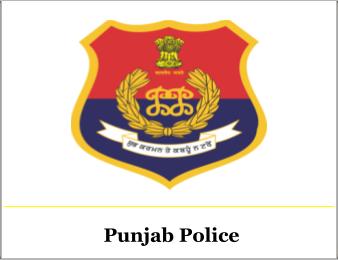Punjab Police
Punjab Police
About
The Punjab Police is responsible for policing in the state of Punjab, India. Its present Director General is a J&K cadre IPS officer Mr. PS Gill. Mission of Punjab Police is the prevention and detection of crime, maintenance of law and order and enforcement of the Constitution of India with an eye on technological advancement and human rights.
Punjab Police has had an extremely proud history and the legend of keeping duty before self. Even before Independence, Punjab Police had a name in the country for effective policing and this has been continuously improving through the personal examples of its leadership supported by great traditions, discipline, and highly professional attitude.
The emergence of Punjab Police as a separate organization is a post-1861 development, which took place after the British annexation of Punjab in 1849. In about 150 years of its existence, the police force in the state has faced many difficult phases. The onus of handling law and order has always been a challenge before the police mainly because of the inherent martial traditions prevailing in the state.
The reorganization process in police dates back to 1898, when the practice of appointing army officers to the post of Inspector General was discontinued. However, a sincere effort was made in 1902 by the British, in the form of Indian Police Commission, to identify the shortcomings in the police system. It was, thus, recommended that the police strength in the state may be enhanced.
Setting up of the Police Training School at Phillaur in 1891, and later the introduction of finger print section has been among the achievements of the Punjab Police.
During the late 1950s, it was felt that further reforms were required in Punjab Police. A commission, headed by an ex-Chief Justice of India, was appointed in 1961, which submitted its report in May 1962. Screening of the police force, setting up of a Scientific Laboratory for crime clue's examination and research centre under Director, Forensic Science Laboratory, better human resource development schemes were among the recommendations of the commission.
Since then, the police force in the state has come a long way. Whether it was the handling of hyper-sensitive mass migration of millions during partition of India and Pakistan, or to control the dacoity menace in the 1950s, or the naxalite violence in the 1960s/1970s, Punjab Police has come out as a winner. Porosity of a thickly populated unnatural land border with Pakistan and extremely inhospitable, barren hill borders with China in Ladakh and Kashmir were manned by Punjab Armed Police Battalions till mid-1960s, till the Border Security Force came into being. Those gallant men on the border faced the brunt of foreign armed aggression in 1962 and 1965. In the recent years, the Punjab Police has successfully suppressed the gory face of terrorism in Punjab, in which nearly 20,000 people lost their lives during 1981–1994. Now, modern communication equipment, state-of-the-art information systems, well-equipped scientific labs, more responsive police personnel, are among the constituents of the Punjab Police
Punjab Police Zones
Punjab Police has a pervasive organisational structure.
D.G.P. headquartered at Chandigarh along with his secretarial staff, including administration, intelligence, security, crime & Forensic Science Laboratory, provisioning and computer wireless & communication.
The State is Divided into Three Zones.
-
Border Zone
-
Patiala Zone
-
Jalandhar Zone
IT Training Centers in Punjab
- IT Training Center PPHQ Chandigarh
- IT Training Center Patiala
- IT Training Center Ludhiana
-
IT Training Center Bathinda
-
IT Training Center Jalandhar
-
IT Training Center Amritsar
-
IT Training Center Ferozepur
-
IT Training Center PPA Phillaur
-
IT Training Center PRTC Jahan Khelan
-
IT Training Center SBS Nager
-
CID Training School Chandigarh
Important Links
Courtesy: punjab police gov.in



